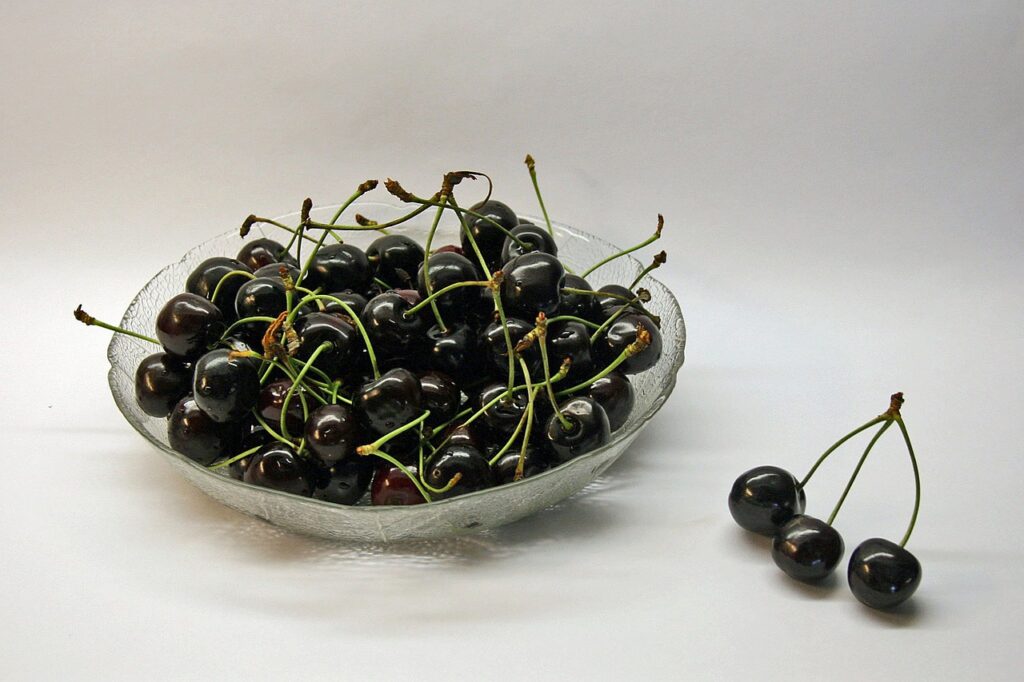You acquired an orchard with an abundance of fresh black cherries; one of the healthiest fruits around.
As always, you are thinking of sharing the healthy goodness of cherries with your furry friend, but another thought crosses your mind; is it safe for dogs to eat black cherries?
Dogs can eat black cherries, but pits, leaves, skins, and stems contain cyanide, which is poisonous to dogs.
If you feed your dog cherries, ensure they are pitted and stemless.
The fleshy part of the cherry is safe for dogs to consume because they contain vitamins A and C and fiber.
This article will discuss everything you need to know about feeding your dog black cherries.
The benefits and risks of feeding cherries to dogs will be explored in detail so that you can make an informed decision about what is best for your pet.

Is It Safe to Give My Dog Black Cherries?
Most fruits are safe and tasty for dogs to eat, such as watermelons, strawberries, and bananas.
However, black cherries raise controversy in the dog community.
For instance, some dog owners believe black cherries aren’t toxic to dogs.
However, pits and stems pose a choking hazard or cause a gastrointestinal blockage if swallowed.
While other pet parents believe that black cherries are toxic to dogs because they contain cyanide.
The Cherry Pit Dilemma
Cherry pits contain cyanide, which is poisonous to humans and animals.
Cyanide prevents cells from using oxygen, which leads to death.
However, it takes a lot of cherry pits for your dog to experience cyanide poisoning.
It’s unlikely that your dog will eat enough cherry pits to cause cyanide poisoning.
The ASPCA classifies black cherries as toxic to dogs, but the severity is low.
Choking Hazard
Puppies and small breeds are more likely to choke on cherry pits.
If your dog swallows a cherry pit, it could obstruct the digestive system.
Cherry pits are hard and sharp; thus, it tears through the gastrointestinal tract.
If the pit isn’t removed, it causes life-threatening infections such as blood poisoning.
Cherry stems are also a choking hazard for dogs.
If your dog swallows a cherry stem, it could get stuck in its throat or digestive system.
The stem is long and thin; thus, it’s easy to get lodged in your dog’s throat.
If the stem isn’t removed, it could puncture your dog’s digestive system.
Cherry Leaves are Poisonous to Dogs
Cherry leaves contain cyanogenic compounds, which release cyanide when ingested.
Cherry leaves are also a choking hazard for dogs.
If your dog swallows a cherry leaf, it could get stuck in its throat or digestive system, especially when ingested in large quantities.

Cherry Poisoning in Dogs: How to Recognize and Treat It
Cyanide poisoning is lethal in dogs.
Symptoms of cyanide poisoning include:
- Dilated pupils
- Hyperventilation
- Abnormal heart rate
- Seizures
- Convulsions
- Tremors
- Collapse
- Death
- Lethargy
- Difficulty breathing
- Bright red mucous membranes.
If you found your dog eating black cherries, immediately call your veterinarian.
Carry the cherry pits, leaves, or stems to the vet.
Let your veterinarian know how many and when your dog ate the black cherries.
Urinalysis, blood tests, and X-rays may be performed to determine the severity of cyanide poisoning.
Treatment options include:
- Intravenous fluids
- Oxygen therapy
- Cyanide antidote
- Stomach pumping (gastric lavage)
- Surgery (if there is an obstruction).
Preventing Cherry Poisoning in Dogs
The best way to prevent cherry poisoning in dogs is to avoid feeding them black cherries in the first place.
If you have an abundance of black cherries, keep them out of reach of your dogs.
Dispose of the pits, leaves, and stems appropriately to prevent your dog from ingesting them.
Black Cherry Nutrition and Health Benefits for Dogs
Source of Vitamins and Minerals
Black cherries are a nutritious fruit for dogs.
They’re a good source of vitamins A and C, potassium, and fiber.
For instance, Vitamins A and C help boost the immune system.
Potassium helps maintain fluid balance in the body, while fiber aids in digestion.
Black Cherries are Antioxidants
Cherries also contain anthocyanins, which are potent antioxidants.
Antioxidants help protect cells from damage caused by free radicals.
Free radicals are unstable molecules that damage cells, leading to inflammation.
Inflammation is a risk factor for chronic diseases such as cancer, heart disease, and arthritis.
Anthocyanins have anti-inflammatory properties that help protect cells from damage.
Aid Sleep Issues in Dogs
Cherries are also a natural source of melatonin.
Melatonin is a hormone that regulates sleep.
It’s produced in the brain and released into the bloodstream when it’s dark outside.
For instance, giving your dog black cherry juice promotes restful sleep.
Prevent Arthritis in Dogs
Dogs who suffer from joint pain may benefit from cherry supplementation.
Cherry juice contains anthocyanins, which have anti-inflammatory properties.
Inflammation is a significant contributor to joint pain.
Cherries help reduce inflammation and relieve joint pain in dogs.
How many Black Cherries can my Dog Eat?
Perhaps while preparing a fruit salad, your furry friend snuck a few black cherries.
One, two, or a handful of black cherries won’t kill your dog.
However, if your dog ate a whole bowl of black cherries, it could experience gastrointestinal upset.
Black cherries contain sugar and pits that could cause an upset stomach in dogs.
Too much sugar leads to weight gain and tooth decay.
The pits also obstruct your dog’s digestive system.
If your dog ate a lot of black cherries, monitor its behavior for the next 24-48 hours.
Signs of gastrointestinal upset include vomiting, diarrhea, and loss of appetite.
If your dog is experiencing any of these symptoms, take it to the vet immediately.
Tips for Serving my Dog Black Cherries
- Wash the cherries thoroughly to remove any pesticides or bacteria.
- Remove the pits, stems, and leaves before giving them to your dog.
- Cut the cherries into small pieces to prevent choking.
- Give your dog a few black cherries first to see how its stomach reacts.
- Monitor your dog’s behavior for any signs of gastrointestinal upset.
- Try freezing the cherries before giving them to your dog. Frozen cherries are a refreshing treat on a hot summer day.
Can Dogs Eat Black Cherries FAQs
At what age can puppies eat black cherries?
Unlike mature dogs, puppies can’t metabolize cyanide as efficiently.
For this reason, wait until your puppy is 12 months old before giving them black cherries.
Can my dog have black cherries with skin?
The skins of black cherries contain cyanogenic glycosides.
These compounds break down into cyanide, which is toxic to dogs.
Thus, remove the skins before giving your dog black cherries.
Are dried black cherries bad for dogs?
Dried black cherries are safe for dogs as long as they don’t contain sulfites.
Sulfites are preservatives that can cause an allergic reaction in some dogs.
Contact the manufacturer if you’re unsure whether the dried cherries contain sulfites.
Can my dog eat rotten black cherries?
Rotten black cherries are dangerous for dogs because they may contain mold.
Mold contains toxins that cause an allergic reaction or gastrointestinal upset in dogs.
Conclusion
When fed in moderation, black cherries are safe for dogs.
Black cherries offer several health benefits, including reducing inflammation and promoting restful sleep.
However, black cherries contain pits and skin that are harmful to dogs.
Thus, remove the pits, stems, leaves, and skins before giving your dog black cherries.
Ask your veterinarian if you’re unsure whether your dog can eat black cherries.
- What Dog Breeds Have Pink Skin? - March 24, 2023
- What Are the Most Inspiring Dog Breeding Quotes? - March 20, 2023
- Can Pheromone Spray Help Improve Dog Breeding Results? - March 19, 2023








